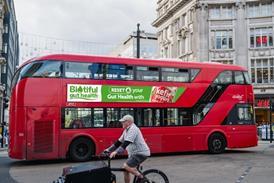Beans
You'll never find baked beans produced on a local farm, and once you've seen the complex production process you'll know why. But since Heinz has been manufacturing baked beans at its Wigan factory since 1958, you can rest assured that you have every right to flag up Heinz Beanz in-store as quality British fare.
Baked beans are made by pouring naked white beans into a dry bean hopper and then feeding them into giant 'blanchers' where they are hydrated to create the ideal texture.
The beans are then taken through two containers which hold water at a very high temperature, before travelling down a steam conveyor.
Laser beams are then used to detect any beans that have defects. Perfect beans continue their journey down one of nine filling lines where they are poured into cans and quickly covered in tomato sauce and sealed.
The filled cans are then conveyed to one of eight sterilisers where they are cooked at a blistering temperature to preserve their contents. After this, the cans are cooled, labelled at an astonishing rate of 600 cans a minute, packed and dispatched. Phew.
Local sausage suppliers can be sourced in every British region. We found Ben & Murray's farm in Cranleigh, Surrey, through their website www.benandmurrays.com.
The farm's free range pigs are able to roam the fields for up to 34 weeks (that's twice as long as some commercially bred pigs).
Once slaughtered, the carcasses are hung in a cold room before being butchered. Loin and belly create succulent bacon, while other parts are chopped for sausages. The meat is mixed with apple chunks for flavour, and sausage rusk to ensure moisture and lengthen shelf-life. The meat is then fed through a mincer.
The minced meat is placed in a filling machine which compacts it into a narrow pipe, and a manually controlled knee-pad allows the meat to be squeezed into collagen casings. This is a delicate process if the meat comes out too fast, then the casing will split; too slow and the sausage lacks stability. The end result is one giant sausage, which is then ready to be linked.
Meanwhile, the bacon cuts have been in the cold room for a week, sealed in a bag with brown sugar and salt. The bag is cut open and the meat rinsed in cold water. Then it's hung in the chiller again to dry for a week before being sliced into rashers.
Eggs
The humble egg is a British breakfast staple with more than 10 billion consumed in the UK every year.
We found John Bishop's free range egg farm in the Surrey village of Abinger Hammer simply by asking around and there's no reason why you can't do the same.
John's farm supplies a number of independent retailers and even some supermarkets in the local area, but despite his significant output the production process is remarkably simple. Each day the team at Rad Farm collect an average of 5,000 eggs from the barn where the hens spend their nights. The eggs are then divided into two batches one for the supermarkets, the other for local independent retailers and members of the public who buy direct. Eggs bound for the supermarkets are collected twice a week by a packer, while John looks after the indies' eggs himself. A quick roll down a simple wooden grading machine quickly divides up the small, medium and large varieties.
Each egg is then individually inspected for quality by John himself, then stamped and dated, and carefully nestled in waiting boxes. Within 48 hours of being laid, the boxed eggs are dispatched to local stores. It is vital that retailers store their eggs at the right temperature (below 20°C) to ensure freshness. Cracking.
Bread
Company heritage doesn't get much more British than that of Warburtons family baker. The first Warburtons loaf was baked in Bolton way back in 1876 by a retailer keen to increase sales by offering something a bit different.
So successful was the retailers' breadmaking initiative that 400,000 tonnes of wheat are now required to bake the two million Warburtons loaves and rolls produced daily.
After eight months of ripening, the wheat is harvested and grains bagged up ready for milling at a local independent facility. Once the wheat has been ground into soft powdery flour it is transported to the Warburtons factory where it is sifted, weighed and stored. The flour is then poured into the main mixer, combined with other raw and wet ingredients and made into a well-aerated dough. When it has been fully mixed, the dough is ejected from the mixer, tipped into a divider and shaped into balls. The dough balls are now almost ready to be baked, all they need is a little rest. The fully rested dough is then moulded, proved and sent to the ovens where it is baked for 22 minutes until crisp and golden.
The hot loaves then take another journey to the cooler where they are blasted with cold air. Next is a visit to the slicer. Once cut, the loaves are packed in wax paper or bags and sent through to despatch.
















No comments yet